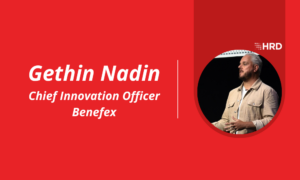How do decisions in the reward space affect talent?
- 6 Min Read
HRD Connect and Debra Corey examine the relationship between reward and talent in a rapidly changing working world.
- Author: Sam Alberti
- Date published: Feb 20, 2020
- Categories

The social climate is changing fast, and talent management has never been a bigger challenge for employers. How can employers take simple, effective measures to roll with the times? With the help of Debra Corey, Chief ‘Pay it Forward’ Officer, DebCo, HRD Connect took a closer look at the relationship between reward and talent today.
With the landscape of the working world changing more and more each day, talent acquisition and retention is becoming a greater challenge for employers. Several generational factors can influence this, including the so-called war for talent, the broadening of age ranges in the workplace, and the growing gig economy, which estimates suggest will be 86.5million strong by 2027[i].
However, there are clear strategies that can be adopted in response to this – most notably, improving employee benefits and rewards. This allows organizations to create a more engaging culture and employee experience. Research from the Limeade Institute[ii] shows that when employees feel cared for, 60% plan to stay in their company for three or more years, as opposed to only 7% of those who do not feel cared for.
Offering a professional perspective on the matter was Debra Corey, Chief ‘Pay It Forward’ Officer, DebCo.
“The role of reward and recognition has changed significantly over the years, with it having a more critical role to play when it comes to talent,” she said.
Corey elaborated on what she perceives to be the catalysts of the situation, stating that “unemployment is the lowest it’s been in 44 years, meaning it’s a job seeker’s market”.
She also cites the “more educated and more vocal” workforce and the fact that “reward and recognition have been proven to be a key driver of employee engagement” as major factors.
Moreover, a report from Thomsons Online Benefits revealed some telling trends about the impact and influence of reward in the workplace, having investigated how people value employee benefits, how they want to access and manage them and how such benefits impact their feelings towards the employer.
Of a sample of more than 2,200 people from around the world, 29% said they would ask about benefits during the first interview, 29% said they would question it during a final stage interview, and 20% said that the response would significantly impact their decision to accept the job.
Aside from the importance of rewards and benefits themselves, the study also showed a disparity between what employees typically want and what is being offered to them. For instance, 45% said they want benefits that offer financial support, whilst only 20% of employers offer this. Similarly, 57% said they want benefits that offer mental wellbeing support, whilst only 23% offer this.
This reflects a significant generational trend in terms of how a workforce’s desires and life goals correlate to its age, with younger generations placing more significance on things like mental health. The study continues to reflect this disparity, showing for example that 61% of 18-25-year olds expect benefits that assist them in keeping fit and healthy, as opposed to 43% of 56-65-year olds. Furthermore, 53% of 26-35-year olds want support from their employer regarding their personal financial situation, yet only 34% of 56 to 65-year olds expect this.
This is microcosmic of what is a rapidly changing office dynamic, with up to 5 generations currently in the workplace. It is estimated that, by 2025, 64% of the workforce will be comprised of generation Y and Z, so the challenges of recruiting, onboarding and retaining are only set to intensify.
It stands to reason that decisions around reward should be tailored and personalized around the differing needs and expectations of the workforce. In theory, this can only lead to happier, more engaged and more effective employees.
“Firstly, they need to be based on a solid and meaningful strategy, rooted in your company’s mission,” Corey continues.
“Secondly, they need to meet the needs of our increasingly more diverse workforce, offering choice and balance. Thirdly, they need to be continually reviewed and updated to keep up with the pace of change, and finally, they need to be communicated to our workforce over and over again to ensure they are understood and appreciated,” she said.
These principles are applicable to what is also a changing social landscape, with greater scrutiny now being placed on the extent to which companies cater for women, ethnic minorities and the best interests of their workforce. In recent years, UK businesses have been operating under regulations which compel them to alter the way in which they report on and publish gender pay gap information. Similarly, with research showing that it will take the average worker 167 years to earn a FTSE 100 leader’s annual pay, CEO pay ratio regulations are now coming into play for organizations nationwide.
Based on this, it has never been more important for companies to cast a critical eye over their approach to equal pay. This falls firmly within the sphere of ‘responsible reward’ – the concept of integrating social and environmental targets into pay structures.
Harvard Business Review research shows that, of a nationwide sample of lawyers, women of colour were the most likely demographic to complete more administrative tasks than their colleagues – over 20% more likely than white men. Moreover, white women were 18% more likely to report doing more admin tasks than white men.
Significant talent exists across numerous demographics, and with governments beginning to introduce metrics that can reliably assess the effectiveness of companies in supporting equal opportunities, there has scarcely been a better time to act. Businesses can effectively acquire and retain talent from BAME demographics by ensuring that the financial climate is geared towards equality.
The link between reward and talent is tangible and significant. Decisions within this space, if grounded more in compassion and equality, can allow businesses to attract and retain talent far more effectively. Moving away from benign, blanket benefit systems, turning attention instead to a more personal approach, can bring company culture to life and improve employee experience, resulting in increased productivity and profitability across the board.
[i] https://zety.com/blog/gig-economy-statistics
[ii] https://www.limeade.com/en/our-story/limeade-institute/









